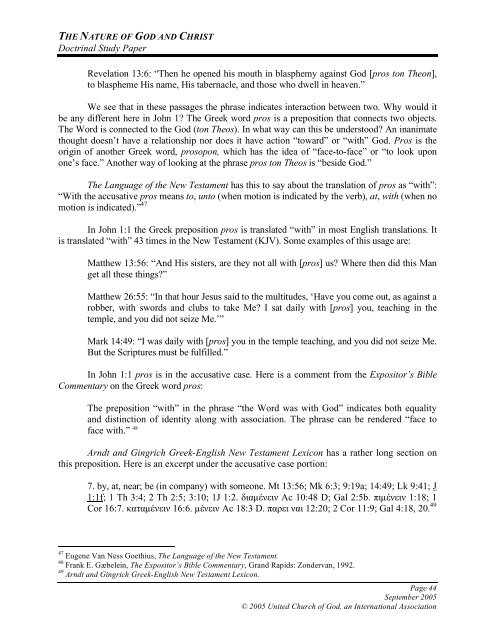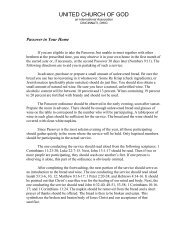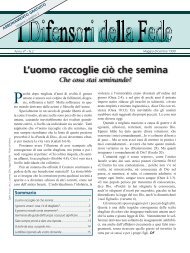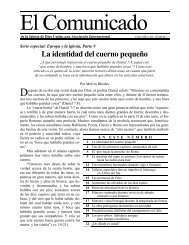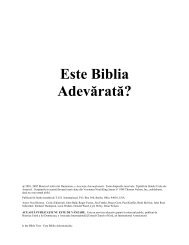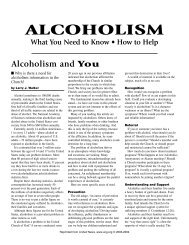The Nature of God and Christ - Members Site - United Church of God
The Nature of God and Christ - Members Site - United Church of God
The Nature of God and Christ - Members Site - United Church of God
- No tags were found...
Create successful ePaper yourself
Turn your PDF publications into a flip-book with our unique Google optimized e-Paper software.
THE NATURE OF GOD AND CHRISTDoctrinal Study PaperRevelation 13:6: “<strong>The</strong>n he opened his mouth in blasphemy against <strong>God</strong> [pros ton <strong>The</strong>on],to blaspheme His name, His tabernacle, <strong>and</strong> those who dwell in heaven.”We see that in these passages the phrase indicates interaction between two. Why would itbe any different here in John 1? <strong>The</strong> Greek word pros is a preposition that connects two objects.<strong>The</strong> Word is connected to the <strong>God</strong> (ton <strong>The</strong>os). In what way can this be understood? An inanimatethought doesn’t have a relationship nor does it have action “toward” or “with” <strong>God</strong>. Pros is theorigin <strong>of</strong> another Greek word, prosopon, which has the idea <strong>of</strong> “face-to-face” or “to look uponone’s face.” Another way <strong>of</strong> looking at the phrase pros ton <strong>The</strong>os is “beside <strong>God</strong>.”<strong>The</strong> Language <strong>of</strong> the New Testament has this to say about the translation <strong>of</strong> pros as “with”:“With the accusative pros means to, unto (when motion is indicated by the verb), at, with (when nomotion is indicated).” 47In John 1:1 the Greek preposition pros is translated “with” in most English translations. Itis translated “with” 43 times in the New Testament (KJV). Some examples <strong>of</strong> this usage are:Matthew 13:56: “And His sisters, are they not all with [pros] us? Where then did this Manget all these things?”Matthew 26:55: “In that hour Jesus said to the multitudes, ‘Have you come out, as against arobber, with swords <strong>and</strong> clubs to take Me? I sat daily with [pros] you, teaching in thetemple, <strong>and</strong> you did not seize Me.’”Mark 14:49: “I was daily with [pros] you in the temple teaching, <strong>and</strong> you did not seize Me.But the Scriptures must be fulfilled.”In John 1:1 pros is in the accusative case. Here is a comment from the Expositor’s BibleCommentary on the Greek word pros:<strong>The</strong> preposition “with” in the phrase “the Word was with <strong>God</strong>” indicates both equality<strong>and</strong> distinction <strong>of</strong> identity along with association. <strong>The</strong> phrase can be rendered “face t<strong>of</strong>ace with.” 48Arndt <strong>and</strong> Gingrich Greek-English New Testament Lexicon has a rather long section onthis preposition. Here is an excerpt under the accusative case portion:7. by, at, near; be (in company) with someone. Mt 13:56; Mk 6:3; 9:19a; 14:49; Lk 9:41; J1:1f; 1 Th 3:4; 2 Th 2:5; 3:10; 1J 1:2. µ Ac 10:48 D; Gal 2:5b. µ 1:18; 1Cor 16:7. µ 16:6. µ Ac 18:3 D. 12:20; 2 Cor 11:9; Gal 4:18, 20. 4947 Eugene Van Ness Goethius, <strong>The</strong> Language <strong>of</strong> the New Testament.48 Frank E. Gæbelein, <strong>The</strong> Expositor’s Bible Commentary, Gr<strong>and</strong> Rapids: Zondervan, 1992.49 Arndt <strong>and</strong> Gingrich Greek-English New Testament Lexicon.Page 44September 2005© 2005 <strong>United</strong> <strong>Church</strong> <strong>of</strong> <strong>God</strong>, an International Association


